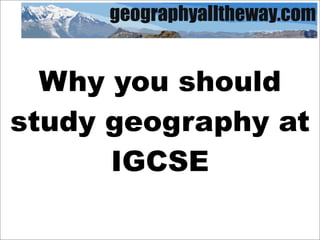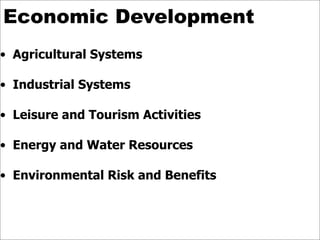geographyalltheway.com: Why Study IGCSE Geography
- 1. Why you should study geography at IGCSE
- 10. Population Studies Population: • Population Structure • Population Growth • Population Distribution • Migration Settlement • Settlement Characteristics • Land Use Models • Urban Congestion • Squatter Settlements • Urban Sprawl • Urbanisation and the Environment
- 11. The Natural Environment • Plate Tectonics • Weathering • River Processes • Marine Processes • Weather • Climate and Ecosystems
- 12. Economic Development • Agricultural Systems • Industrial Systems • Leisure and Tourism Activities • Energy and Water Resources • Environmental Risk and Benefits
- 13. How the course is assessed • Paper 1 (45%): 1 hr 45 min - Answer three questions from six. This paper is resource-based and involves problem solving and free response writing. • Paper 2 (27.5%): 1 hr 30 min - This paper will be mainly skills-based and will test your ability to handle various ways of depicting geographical information. • Online Assessment (27.5%) based upon the skills involved in carrying out geographical data collection and interpreting the results.
- 14. What about after IGCSE? • International Baccalaureate • AS/A2 course (UK) • IGCSE is International recognised! • Further training – transferable skills. • Geography based degree at university – or not!
















